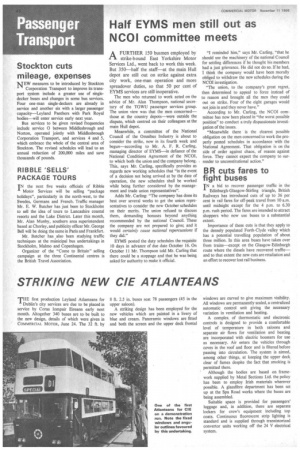Half EYMS men still out as NCO! committee meets
Page 50

If you've noticed an error in this article please click here to report it so we can fix it.
AFURTHER 150 busmen employed by strike-bound East Yorkshire Motor Services Ltd., went back to work this week. But 350—half the staff—at the main Hull depot are still out on strike against extra city work, one-man operation and more spreadover duties, so that 50 per cent of EYMS services are still inoperative.
The men who returned to work acted on the advice of Mr. Alan Thompson, national secretary of the TGWU passenger services group. The union view was that the men concerned— those at the country depots—were outside the dispute, which centred on their colleagues at the main Hull depot.
Meanwhile, a committee of the National Council of the Omnibus Industry is about to consider the strike, now in its fourth week and begun—according to Mr. A. F. R. Carling, managing director of EYMS—in defiance of the National Conditions Agreement of the NCOL to which both the union and the company belong. This, says Mr. Carling, specifically provides as regards new working schedules that "in the event of a decision not being arrived at by the date of operation, the new schedules shall be worked while being further considered by the management and trade union representatives".
Adds Mr. Carling: "The company has done its best over several weeks to get the union representatives to consider the new October schedules on their merits. The union refused to discuss them, demanding bonuses beyond anything recommended by the national Council. These the company are not prepared to give; and it would certainly cause national repercussions if they did."
EYMS posted the duty schedules the requisite 10 days in advance of due date October 16. On October 11 Mr. Thompson told Mr. Carling that there could be a stoppage and that he was being asked for authority to make it official. "I reminded him," says Mr. Carling, "that he should use the machinery of the national Council for settling differences if he thought his members had a just grievance. He did not do so. If he had, I think the company would have been morally obliged to withdraw the new schedules during the NCOI investigation.
"The union, to the company's great regret, then determined to appeal to force instead of to reason and brought all the men they could out on strike. Four of the eight garages would not join in and they never have."
According to Mr. Carling, the NCOI committee has now been placed in "the worst possible position" to conduct a truly dispassionate investigation of the issues.
"Meanwhile there is the clearest possible obligation on the men concerned to work the properly posted schedules in accordance with the National Agreement. That obligation is on the side of order against chaos, of reason against force. They cannot expect the company to surrender to unconstitutional action."
































































































































